The transition from dictatorship to democracy is a complex and multifaceted process that requires a careful balance of political, social, and economic factors. This process has been successfully achieved in several countries around the world, including Argentina, Greece, and Serbia. As we navigate the post-Covid-19 era, Austria can learn valuable lessons from these case studies to facilitate its own democratic transition.
Firstly, it is important to understand that the journey from dictatorship to democracy is not a one-size-fits-all process. Each country has its unique set of circumstances and challenges that need to be addressed. However, there are common levers that can be used to facilitate this transition.
1. Political Reforms: The first step in transitioning from a dictatorship to a democracy is implementing political reforms. This involves establishing democratic institutions such as an independent judiciary, free press, and fair electoral systems. In Argentina’s case, after the fall of the military junta in 1983, the country embarked on a series of political reforms that included holding free and fair elections and establishing an independent judiciary.
2. Economic Reforms: Economic reforms are also crucial in this transition process. They help create a level playing field where everyone has an equal opportunity to succeed. In Greece’s case, after the fall of the military junta in 1974, the country implemented economic reforms that included liberalizing its economy and joining the European Union.
3. Social Reforms: Social reforms are equally important in this transition process. They help heal societal divisions and promote social cohesion. In Serbia’s case, after the fall of Slobodan Milosevic in 2000, the country embarked on a series of social reforms that included promoting reconciliation and addressing human rights abuses.
Austria’s Way back to Normal
In Austria’s case, while it is not under a dictatorship per se, there have been concerns about democratic backsliding due to measures taken during the Covid-19 pandemic such as restrictions on civil liberties. To ensure that Austria remains a vibrant democracy post-pandemic, it can draw lessons from these case studies.
Political reforms could involve strengthening checks and balances on executive power and ensuring transparency in decision-making processes. Economic reforms could involve ensuring that pandemic recovery efforts are inclusive and do not exacerbate existing inequalities. Social reforms could involve promoting social cohesion through dialogue and understanding.
In conclusion, turning dictatorship into democracy is a complex process that requires careful balancing of political, economic, and social factors. While each country’s journey is unique, there are common levers that can be used to facilitate this transition. As Austria navigates the post-Covid-19 era, it can draw valuable lessons from countries like Argentina, Greece, and Serbia to ensure its continued democratic vibrancy.
